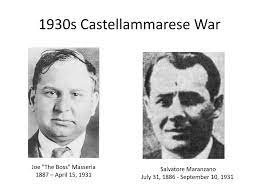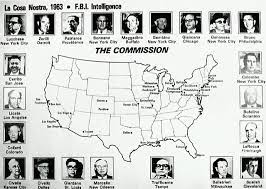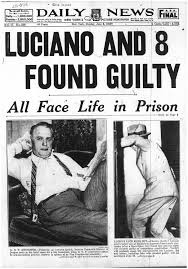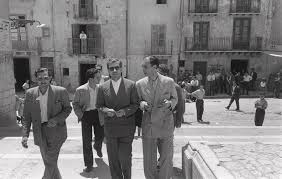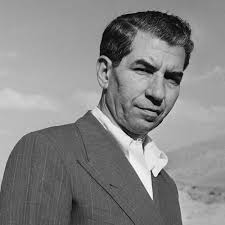

Lucky Luciano
11/24/1897 - 1/26/1962
Early Life:
Born Salvatore Lucania on November 24, 1897, in Lercara Friddi, Sicily, Luciano immigrated to America with his family in 1906 when he was eight years old. Settling in the Lower East Side of Manhattan, young Luciano quickly became involved in criminal activities, eventually rising to the pinnacle of the underworld.
The Lucania family, like many other Italian immigrants, sought better opportunities in America. They arrived during a wave of immigration that saw millions of Italians settling in New York City. The family’s new home in the Lower East Side was a melting pot of ethnicities but also a breeding ground for crime. Young Salvatore, later known as Charles or "Lucky," adapted quickly to his new environment. He learned English and became street-smart, skills that would serve him well in his future endeavors.
Early Criminal Activities:
Luciano's first foray into crime was at a young age. By the time he was 14 he had dropped out of school and joined a street gang. He started a job delivering hats, earning $7 per week. However, after winning $244 in a dice game, Luciano quit his job and began earning money on the street. His reputation for being tough and resourceful grew, and he quickly became a prominent figure among the youth gangs of the Lower East Side.
Luciano's rise in the criminal world began when he joined the Five Points Gang, a notorious group led by Paolo Vaccarelli, also known as Paul Kelly. The gang was involved in various illegal activities, including extortion, gambling, and prostitution. Luciano's ability to navigate the treacherous world of organized crime earned him respect and a reputation as a formidable operator.
One of Luciano's significant strengths was his ability to forge alliances. He cultivated relationships with prominent figures in the criminal world, including Meyer Lansky, a Jewish gangster with a keen mind for business. Luciano met Meyer Lansky as a teenager, when Luciano attempted to extort Lansky for protection money on his walk home from school. Luciano respected the younger boy's defiant responses to his threats, and the two formed a lasting partnership. This alliance was pivotal, as it allowed Luciano to expand his operations and influence beyond the Italian-American community.
By 1920, Luciano had met many future Mafia leaders, including Vito Genovese and Frank Costello, his longtime friend and future business partners through the Five Points Gang. That same year, Lower Manhattan gang boss Giuseppe “Joe the Boss” Masseria recruited Luciano as one of his gunmen.
Also around that same time Luciano started working for gambler Arnold “The Brain” Rothstein who would educate Luciano on running the bootlegging business. Luciano would go on to start his own bootlegging business with partners Frank Costello and Vito Genovese with financing from Rothstein.
In 1923, Luciano was caught in a sting selling heroin to undercover agents. Although he saw no jail time, being outed as a drug peddler damaged his reputation among his high-class associates and customers.
By 1925, Luciano was grossing over $12 million per year, and made a personal income of about $4 million per year from running illegal gambling and bootlegging operations in New York that also extended into Philadelphia.
From 1916 to 1936, Luciano was arrested 25 times on charges including assault, illegal gambling, blackmail and robbery but spent no time in prison.
The Castellammarese War:
The early 1930s saw a brutal power struggle within the Italian-American Mafia, known as the Castellammarese War. This conflict pitted two major factions against each other: the Masseria faction, led by Joe "The Boss" Masseria, and the Maranzano faction, led by Salvatore Maranzano. Luciano, initially aligned with Masseria, however he secretly sided with Maranzano in the bloody war and helped set up Masseria for assassination in 1931. Before the end of the year, Luciano and other “Young Turks'' would knock off Maranzano, and the era of the Old World “Mustache Petes” would be over.
Betrayal and Ascendancy:
He then turned against Salvatore Maranzano, who had declared himself the "Boss of All Bosses." With Maranzano's elimination, Luciano emerged as the most powerful figure in the American Mafia. He was instrumental in establishing the Commission, a governing body designed to mediate disputes and oversee Mafia operations across the country.
The creation of the Commission was a revolutionary step in the organization of the American Mafia. Luciano's vision was to create a democratic structure where the heads of the various Mafia families could collaborate and resolve conflicts without resorting to violence. The Commission consisted of the leaders of the Five Families in New York, as well as representatives from other major cities.
Modernizing the Mafia:
Luciano's leadership marked a shift from the old-world ways of the Mafia to a more modern, business-like approach. He encouraged the diversification of criminal activities, including drug trafficking, prostitution, labor racketeering, and illegal gambling. His ability to balance brutality with strategic thinking enabled him to maintain control and expand his influence.
The Prostitution Case:
Luciano's criminal empire faced significant challenges in the late 1930s. In 1936, he was prosecuted by Special Prosecutor Thomas E. Dewey on charges of compulsory prostitution. Dewey's relentless pursuit of Luciano led to a high-profile trial that resulted in Luciano's conviction and a sentence of 30 to 50 years in prison. Despite his incarceration, Luciano continued to run his crime family from prison, relaying his orders through acting boss Genovese. In 1937, Genovese fled to Naples to avoid an impending murder indictment in New York, so Luciano appointed his consigliere, Costello, as the new acting boss and the overseer of Luciano's interests. Luciano's legal appeals continued until October 10, 1938, when the U.S. Supreme Court refused to review his case. At this point, Luciano stepped down as family boss and Costello formally replaced him.
During World War II, Luciano offered his services to the U.S. government in exchange for leniency. His connections with Italian and Sicilian dockworkers were seen as valuable in preventing sabotage and aiding the Allied invasion of Sicily. This cooperation led to a commutation of his sentence, and in 1946, Luciano was deported to Italy, never to return to the United States. Luciano turned over leadership of the national Commission to Frank Costello.
Life in Exile:
In Italy, Luciano continued to be involved in criminal activities, maintaining contact with Mafia leaders in the United States. He spent his later years between Italy and Cuba, where he attempted to establish a new base of operations. However, increased scrutiny from both American and Italian authorities limited his ability to exert the same level of influence he once had.
Death and Enduring Impact:
Charles "Lucky" Luciano died of a heart attack on January 26, 1962, at the Naples International Airport. He had gone to the airport to meet with American producer Martin Gosch about a film based on his life.He was unaware that Italian drug agents had followed him to the airport in anticipation of arresting him on drug smuggling charges.His funeral in Naples was a testament to his enduring legacy, attended by many who recognized his impact on organized crime.
Luciano's life and career left an indelible mark on the history of the American Mafia. His reorganization of the Mafia's structure and his establishment of the Commission created a more cohesive and powerful criminal organization. His ability to blend ruthless violence with strategic innovation set the standard for future generations of mobsters. Despite his criminal activities, Luciano's legacy is also a testament to his remarkable ability to adapt and thrive in the face of adversity.
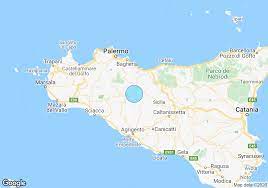

Lercara Friddi, Sicily
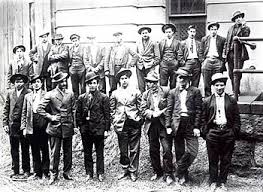

Five Points Gang
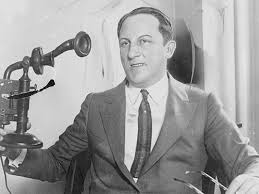

Arnold "The Brain" Rothstein
